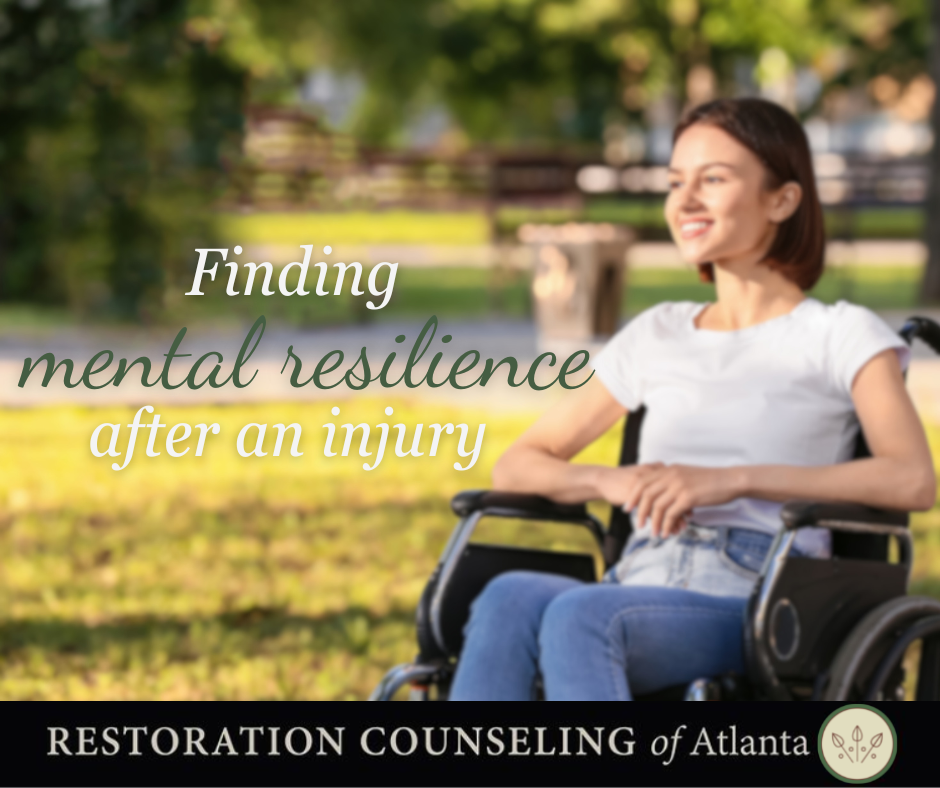After suffering an injury recently, I found myself facing some unwanted limitations in my daily routine. I felt challenged to maintain a positive attitude and not feel sad, worried, and even angry at God. Naturally, anybody who faces major health issues such as surgery, an injury, or a heart attack confronts serious physical hurdles to regain their former capabilities. But is it normal to be so emotionally affected by a common physical injury?
Mood Symptoms are to be Expected
Because our minds and bodies are inseparable, psychological symptoms of anxiety and depression are a normal reaction to an abnormal experience of physical trauma, according to the NHS.
Depression/Low Mood Symptoms
- Continuous low mood or sadness
- Feelings of hopelessness or helplessness
- Having low self-esteem
- Feeling tearful or guilty
- Irritability and intolerance of others
- Having low motivation or interest in things
- Difficulty making decisions
- Not getting enjoyment out of life
- Passing suicidal or self-harming thoughts
Anxiety Symptoms
- Feeling anxious, worried, or uneasy
- Sleeping problems
- Lack of concentration
- Faster breathing
- Pounding heartbeat or palpitations
- Feeling sick or faint
- Feeling tearful or on the edge
- Sweating
- Headaches
Per the NHS, these symptoms should improve with time and without much effort; however, when you notice that they last longer than expected or are interfering with your ability to perform normal daily activities, it is time to talk with your healthcare provider and/or seek treatment with a professional counselor. This is particularly important in the case of suicidal thoughts or if they are interfering with your ability to participate in rehab.
Managing Your Mood Matters
Sports psychologist Harley de Vos said there was compelling evidence supporting the relationship between mental health and injury. “Prolonged stress and depressive symptoms like low mood can actually hinder our physiological ability to recover from injury,” he said. “If we’re only working on the physical, we may actually not be making our optimal recovery” (Landau, 2024).
“There is no question that your state of mind can dictate how quickly you can return from a physical setback,” says Dr. Jeff Huffman, director of the cardiac psychiatry research program at Harvard-affiliated Massachusetts General Hospital (Harvard, 2019).
Everyone has their usual coping mechanisms for daily stressors, but many of these may not be available after an injury, including doing your usual exercises, playing with the kids and/or pets, and even resting in your usual positions. Given new limitations, then, it is important to avoid unhealthy coping skills like drinking alcohol, taking non-prescribed drugs, losing yourself in work, isolating, etc., as these may negatively impact your emotional well-being in the longer term.
Adaptive coping strategies can include meditation, getting enough sleep, having a healthy diet, finding new ways to move that encourage your body to release stress, getting outside to soak up the sun, etc. Healthy coping should also include asking for help from family, friends, and neighbors. These folks are often willing and able to help while you are recovering—you just need to ask.
Self-Worth Challenges
To that point, being sidelined by physical limitations can raise questions about self-worth, as you are no longer able to do as you used to. You will have to rely on others to accomplish many things you used to do with your eyes closed. This situation can make you feel that you are not yourself, that you are a burden or an imposition, but managing such negative thoughts and incorporating healthy coping skills are critical to resilience.
Seven Tips
- Acknowledge the hard.
It is important to acknowledge that this situation is difficult for you. Be self-compassionate and allow sadness, shock, loss, etc., to be a real part of your story. But don’t get stuck here! Keep looking for the growth that comes from struggles.
- Recognize that rest and healing are productive.
Once you accept that it is okay to rest, heal, and break from usual activity, you may find moments that you can feel good about, even if it’s just flashes of laughter from streaming a show or reading a book.
- Practice gratitude.
Not necessarily for the physical limitation (though you may eventually see God using that for your benefit), but for what you can learn during this period of healing.
Observe how people show up for you. There are lots of givers in the world, and God intended for us to be yoked together in our communities for occasions such as these. They joy in using their gifts for you!
Romans 12:8 (NLT) says: “If your gift is to encourage others, be encouraging. If it is giving, give generously. If God has given you leadership ability, take the responsibility seriously. And if you have a gift for showing kindness to others, do it gladly.”
- Focus on what you can control.
“No matter the nature or expected duration of your injury, there are still things you can do that can help you feel productive, active, and keep you mostly in a positive headspace. ‘Even though you may not be able to exercise or even move very much depending on your injury, you can control what you eat, what you drink, and your attitude toward your health,’ says Laura Arndt, a certified strength and conditioning specialist, and personal trainer. ‘If you focus on fueling your body with the right foods, your blood sugar and mood will stay more even-keeled and you’ll feel a lot better emotionally and physically’” (Muska, 2017).
- Meditate and be introspective.
“Meditation is helpful in relieving a depressed mood and is accessible for everyone,” says Rev. Connie L. Habash, MA, LFT, a therapist who also teaches yoga and meditation. “Simply sitting still and focusing the mind on the breath calms the nervous system, reduces stress, and supports optimal healing in addition to alleviating the mental agitation that often comes from feeling limited due to injury” (Muska, 2017).
In these moments of looking inward, you can observe patterns of behavior in your life that you want to change, such as putting family time at the top of your priorities list or discovering a desire to take on a new hobby or adventure. Being cared for as a patient may lead you to a new passion for giving to others when you are healed. You may uncover a deep desire to live closer to (or further away from!) loved ones.
- Notice your strengths.
You can also build self-confidence as you prove yourself stronger than you thought through your recovery. This may come from revealing a will to press through difficult rehab exercises, or resourcefulness to find transportation and support for your daily needs. The possibilities are unlimited if you are open to God’s leading in this time.
- Remember that it won’t always be this bad.
The key is to be gentle with yourself and remain hopeful. Even if the physical impairment persists for the rest of your life, you will find independence and agency again. Life may not look like you expected it would but keep working toward growth and healing. It may take some work, and it may take some time, but it will be worth doing whatever it takes.
References
Harvard.edu. (April 1, 2019). The mental side of recovery. From: https://www.health.harvard.edu/mind-and-mood/the-mental-side-of-recovery
Landau, S. (Mar 10, 2024). Mood management linked to quicker physical recovery following injury, says sports psychologist. Retrieved from: https://www.abc.net.au/news/2024-03-11/injury-recovery-linked-to-mood-body-mind-healing/103552254
Muska, S. (Oct. 23, 2017). What a physical injury taught me about my mental health: What you can do to keep your mood up while your body is down. Retrieved from: https://www.nbcnews.com/better/health/whatphysical-injury-taught-me-about-my-mental-healthncna811166
NHS. (n.d.). Looking after your emotional wellbeing following a physical injury. Retrieved from: https://www.uhcw.nhs.uk/download/clientfiles/files/Patient%20Information%20Leaflets/ Trauma%20and%20Neuro%20services/Major%20Trauma/Looking%20after%20your%20e motional%20well-being%20following%20a%20physical%20injury.pdf

Written by Paige Santmyer, MA LPC NCC CCATP
Roswell location
paige@restorationcounselingatl.com, ext. 157
Paige provides counseling to adults ages 18+ experiencing anxiety, depression, relationship issues, parenting struggles, and life transitions. She uses a personalized approach of Client-Centered Therapy and Relational Psychoanalysis, as well as techniques from Cognitive Behavioral Therapy (CBT), Positive Psychology, and Exposure and Response Prevention (ERP). She has a certificate in both anxiety and trauma treatment.

